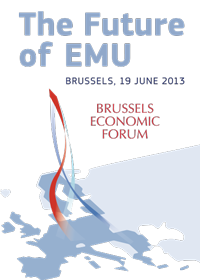
Accessibility tools
Service tools
Language selector
- Current language: en
Navigation path
- European Commission
- Economic and Financial Affairs
- Brussels Economic Forum 2013
- Recordings and photos
Olli Rehn, Vice-President, European Commission
Europe out of intensive care, but still needs medicine
Europe, whose fate still seemed at times to be in the balance just a year ago, “is no longer in intensive care,” according to European Commission Vice-President and Commissioner for Economic and Monetary Affairs and the Euro, Olli Rehn. But in his opening address to the 2013 Brussels Economic Forum on June 19, Rehn warned that Europe was only gradually emerging from the crisis, and that “our patient will need surveillance and medication still for some time to come.”
Vice-President Rehn said three broad factors were responsible for the changing mood. The first is the anchoring of financial stability thanks to measures taken by the EU’s authorities, notably the creation of the European Stability Mechanism last year, and the European Central Bank’s intervention programme announced to stabilise the markets.
The second, Rehn said, was the redressing of some market imbalances. “The EU's policy mix is focused on sustainable growth and job creation. In fiscal policy, consistent consolidation of public finances will continue, though with a slower pace,” he said.
And third, there have been reforms. “Serious steps of deeper integration have been taken, from the reinforcement of economic governance to the Single Supervisory Mechanism of euro area banks. And more is to come,” Rehn said. “And in six months' time, far from having fewer members, the euro area will have more members,” he said, referring to Latvia’s imminent joining of the single currency.
Yet Rehn said the EU needed to remain vigilant about the challenges ahead. “At the same time, we are of course not yet out of troubled waters,” he said. “Stress in financial markets has been significantly reduced, but this has not yet transmitted much into the real economy. Europe is only gradually emerging from the crisis, the divergences in the euro area remain large, and unemployment is at record highs in many countries.”
Rehn said Europe faced profound structural problems, largely stemming from the credit booms, the debt-fuelled real estate bubbles and the public sector overexpansion in many member states. Of the many interlinked issues that provoked and prolonged the economic crisis, he said that the banking sector was in particular need of reform. “We have done much to repair the financial sector, but more needs to be done,” he said. “Much has been achieved, but much remains to be done. The single rule book for banks and other financial market actors has advanced considerably.”
The Commissioner argued that banking union is essential to reverse the process of financial fragmentation in Europe and, thus, to preserve the integrity of the single market in the EU for financial services. “Banking union is not about bailing out bankers, it is about getting a banking system that serves the real economy,” he said.
Rehn finished with a warning not to try moving too fast, or to ignore the popular mood. “A deep fiscal union will not emerge overnight. We will lose our citizens unless this is done through a profoundly democratic process – and even the best economic ideas must pass this test before they can be realised,” he said.























